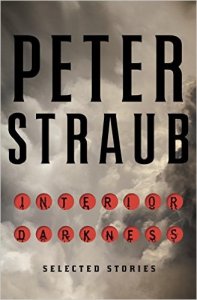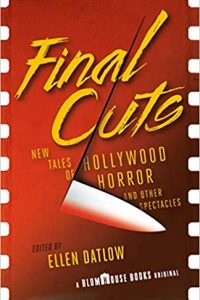Gary K. Wolfe reviews Peter Straub
Interior Darkness: Selected Stories, Peter Straub (Doubleday 978-0-385-54105-3, $28.95, 496pp, hc) February 2016.
 Except for a couple of small press editions, it’s been 16 years since Peter Straub’s last major story collection Magic Terror, and it was ten years before that when his first collection, Houses Without Doors appeared. We can correctly deduce from this that Straub is not a particularly prolific writer of short fiction, which in turn means that the retrospective collection Interior Darkness: Selected Stories gives us a pretty complete overview of his shorter work, even if a few favorites might be missing. Four things become apparent at once: first, Straub’s shorter fiction is not really a sideline to novel-writing. Although some of the stories here, like ‘‘Blue Rose’’ or ‘‘Mallon the Guru’’, help illuminate novels with some of the same characters, each story is carefully crafted to its own demands, and sometimes those demands result in substantial, complex novellas. Second, the stories remind us that even though Straub’s novels may at times seem convoluted with multiple viewpoints, time frames, and embedded tales, the core of his fiction lies in the observation of character and the core of his style lies in the carpentry of sentences, which can at times be stately, ironic, and terrifying all at once.
Except for a couple of small press editions, it’s been 16 years since Peter Straub’s last major story collection Magic Terror, and it was ten years before that when his first collection, Houses Without Doors appeared. We can correctly deduce from this that Straub is not a particularly prolific writer of short fiction, which in turn means that the retrospective collection Interior Darkness: Selected Stories gives us a pretty complete overview of his shorter work, even if a few favorites might be missing. Four things become apparent at once: first, Straub’s shorter fiction is not really a sideline to novel-writing. Although some of the stories here, like ‘‘Blue Rose’’ or ‘‘Mallon the Guru’’, help illuminate novels with some of the same characters, each story is carefully crafted to its own demands, and sometimes those demands result in substantial, complex novellas. Second, the stories remind us that even though Straub’s novels may at times seem convoluted with multiple viewpoints, time frames, and embedded tales, the core of his fiction lies in the observation of character and the core of his style lies in the carpentry of sentences, which can at times be stately, ironic, and terrifying all at once.
Third, the labels that conveniently attach themselves to Straub’s work (and the work of some writers he has influenced) – labels like ‘‘literary horror’’ or ‘‘dark fantasy’’ – don’t really work anymore. ‘‘Literary horror’’ has always struck me as either redundant or patronizing or just stupid, like ‘‘musical jazz,’’ while ‘‘dark fantasy’’ is belied by the actual contents of most of the stories here, which may be profoundly disturbing, comical, or surreal, and which are certainly dark enough, but which seldom contain much in the way of supernatural interventions in human affairs. Straub, who once edited an anthology called Poe’s Children, shares with that progenitor the insight that the dark forces within ourselves are perfectly poised to create murderous chaos without the help of elder gods or pesky revenants, and hence my fourth observation: Interior Darkness is not a convenient metaphorical catch-all title, but rather a precise description of the motivations and desires that set most of these tales in motion.
This is nowhere more apparent than in the two earliest stories here, ‘‘The Blue Rose’’ from 1985 and ‘‘The Juniper Tree’’ from 1988. Straub fans will recognize these as part of Straub’s ‘‘Blue Rose’’ series, which includes a couple of other stories as well as the novels Koko, Mystery, and The Throat. But even those who aren’t aware that the boy Harry Beevers of ‘‘The Blue Rose’’ will show up in Koko will find it hard to forget his blithe psychopathy toward his innocent younger brother, while the unwavering and genuinely horrifying description of child abuse in ‘‘The Juniper Tree’’, conflated with a favorite film noir in the mind of the narrator, a novelist remembering the events from decades later, is equally unsettling. In ‘‘The Buffalo Hunter’’, it’s literature rather than film noir that frames the protagonist’s reimagining his lonely life; as he drinks vodka from his odd collection of baby bottles, he calls to mind a Walter Mitty who might have been invented by Melville. But then, Melville will get his own pride of place later on with the long novella ‘‘Mr. Clubb and Mr. Cuff’’, the longest single piece in the book, a now-almost-classic tale of a revenge plan gone horribly wrong, which carries weird echoes of Melville’s Bartleby and a finely tuned narrative voice that owes as much to Henry James as to Poe or Melville.
Straub’s smooth manipulation of narrative voices has always been a strength of his fiction, and as a result that fiction is often more experimental than it seems on the surface. ‘‘A Short Guide to the City’’ begins as exactly that, a chamber-of-commerce piece that grows apocalyptic as it begins describing a serial killer still at large, the ‘‘remains of the city’s museum and library’’ after the ‘‘disturbances’’, and the unfinished bridge span that hangs in mid-air as a symbol of the city’s actual fate. ‘‘Ashputtle’’ reimagines a version of Cinderella from the viewpoint of an overweight, resentful, and increasingly ominous elementary school teacher who moves from city to city for reasons that gradually become all too clear, and ‘‘Pork Pie Hat’’ – to my mind one of the very best stories about jazz – is a tale within a tale, as the narrator recalls his days as a graduate student in New York, meeting the legendary saxophonist Hat, learning a strange tale of what happened to Hat on a long-ago Halloween in Mississippi, and finally, years later, piecing together the meaning of Hat’s story.
In the stories published after 2000, sometimes in journals like Conjunctions and sometimes as standalone novellas, Straub’s voices become more pointedly experimental in nature. ‘‘Little Red’s Tango’’ is in the form of a kind of positio, complete with alleged ‘‘miracles,’’ for the beatification of the title figure, a mysterious and reclusive New Yorker who seems to be able to get for people whatever they need. ‘‘Lapland, or Film Noir’’, is an often hilarious send-up of many of the conventions of crime movies, while ‘‘The Collected Short Stories of Freddie Prothero’’ is the most adventurous stylistic game of all, a kind of Pale Fire for preschoolers, as a pompous scholar presents the fragmentary efforts of a four-to-eight-year old boy whose creative spelling, when decoded, reveals the actual story beneath. But, to my mind, the most impressive of these later fictions, and the strangest story in the book, is the enigmatic fantasy novella ‘‘The Ballad of Ballard and Sandrine’’, which describes the paraphilic relationship of the title characters over a period of more than twenty years, mostly on a series of Amazon river cruises in which they seem to be the only passengers, on which the unseen crew speaks a weird, bird-like language, and during which the river piranhas demonstrate an insatiable appetite for Victorian novels. For years, Straub has been recognized as a pretty slippery character when it comes to reader expectations, one who ‘‘defies and blurs literary genres,’’ as Lorrie Moore says in her blurb here, but it seems that, in Interior Darkness, the very idea of genre has become little more than a grammar for constructing fictions that follow their own rules.






